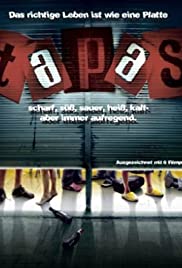
TAPAS
Spain, 2005, 93 minutes, Colour.
Angel de Andres, Maria Galliana, Elvira Minguez, Reuben Ochandiano, Alberto Jo Lee.
Directed by Jose Corbacho Juan Cruz.
Tapas is a slice of life – at a street corner in the city of Barcelona. Audiences may reminisce about a similar situation for Wayne Wang’s Smoke, based on stories by Paul Auster and starring Harvey Keitel as the manager of a bar who observes people in the neighbourhood, takes photos of them.
There are separate stories in this tapestry – although Tapas refers to take it or leave it Spanish takeaway food. There is a focus on the owner of the bar, a boorish man who alienates his wife, doesn't understand what he has done, is given good advice by his prostitute friend and eventually sets off to find her and to be reconciled. He also hires help in the form of a Hong Kong chef – one of the most sympathetic characters in the film.
One of the other stories concerns a divorced woman who is in email correspondence with a man from Argentina and feeling the absence of a man in her life. She has a brief affair with the son of one of the customers in her shop, a boy who works at the supermarket and who inexplicably falls in love with her. His story also concerns his friend, a young man who is obsessed with talking about sex.
The other story is about an elderly woman whose husband is dying of cancer. Surprisingly, she is the local drug pedlar and the young clients come to her. However, in her non-drug scenes, she is a very sympathetic woman and the scenes between herself and her dying husband, especially their final banquet, are quite touching.
The film does offer a slice of life, glimpses into human nature, the possibility of some kind of redemption, even at a very local level. However, it is very much in the television soap opera or mini-series style.
1. A Spanish slice of life? Street corner drama? The soap opera elements? Did the film transcend these and soap opera stories? Characters, situation, plot?
2. The neighbourhood in Barcelona, the streets, the bars, the shops, homes? Ordinary life? Ordinary people? The musical score?
3. The title, the reference to Tapas, the bar, meals?
4. The interconnected stories, the introduction to each of the central characters, their interactions? The focus on the four stories and audiences appreciating them?
5. Rachel’s story, the opening, sexuality, her loneliness, the chat room with Edgardo in Argentina? Her work at the shop, her husband having left her, the gossip with the customers, her kindness? The broken video, Cesar and his coming to help? Her inviting him to dinner, the sexual liaison, the effect on her, on him? His return visits? Her seeing no future? The imminent coming of Edgardo? Cesar’s birthday party, her bringing the gift, a memory for him, their final kiss? His delivering the video, Edgardo at the door and taking it up? Rachel’s future?
6. Cesar and Opo, going to work, stacking the shelves in the supermarket, their chatting about girls and assessing the summer, Opo and his sex preoccupation? His preoccupation with Bruce Lee and conspiracy theories about his death? Cesar and his fixing the video, his relationship with his mother? The women gossiping about him and his girlfriend? In front of Rachel? His going to Rachel’s for the meal, the sexual encounter, its effect on him, the return? His not wanting to break off? Delivering the video, meeting Edgardo? Going up the street with Opo? His party, the gift from Rachel? The change in him? His going on the camp?
7. Conchi and her freeing the dog after breaking the car window? Going to Lolo’s bar? The irony of her being the drug dealer? Going shopping, claiming she had little money? Her relationship with her husband, the long years together? Opo’s visit and Mariano telling him about the cancer? Her continuing to deal the drugs, for Opo for the birthday party? Her life at home, trying to help Mariano? His going shopping, his fainting, at the doctor’s? Not long to live, his explaining all this to Opo? The final meal, the lavish meal, the dancing, “Fly Me To The Moon”? His taking the drug, his death?
8. Lolo as the big and gross man, bossing his wife around, her exasperation, her packing and leaving? His covering it up, saying she was sick? The bar and all the clientele of the neighbourhood? His wanting a substitute cook? Getting Mao? His racism, hiding Mao, pretending that he was Rosario? His giving the orders, Mao and his thorough work? Lolo and his going to the prostitute, for many years, her commonsense advice, understanding him, friendship? Her advice about Rosario? Mao and his character, silent, martial arts? His skills and everybody appreciating the food? Going out each night with his girlfriend? His work for the party? Lolo and the change, Rosario’s phone call, his being cross with her on the phone? His decision to go on the holiday and meet her? Leaving the bar the Mao, the extra wages? Mao and his chatting to the customers, Opo and the question about Bruce Lee – and Mao saying he was still alive?
9. The women in the neighbourhood, gossip, ribald jokes, their shopping?
10. Glimpses of human nature, older and younger generation, ordinary life, humdrum life, dreams, unfulfilled dreams? Drinking, drugs, boredom? The film’s comment on human nature, resilience, hopes?